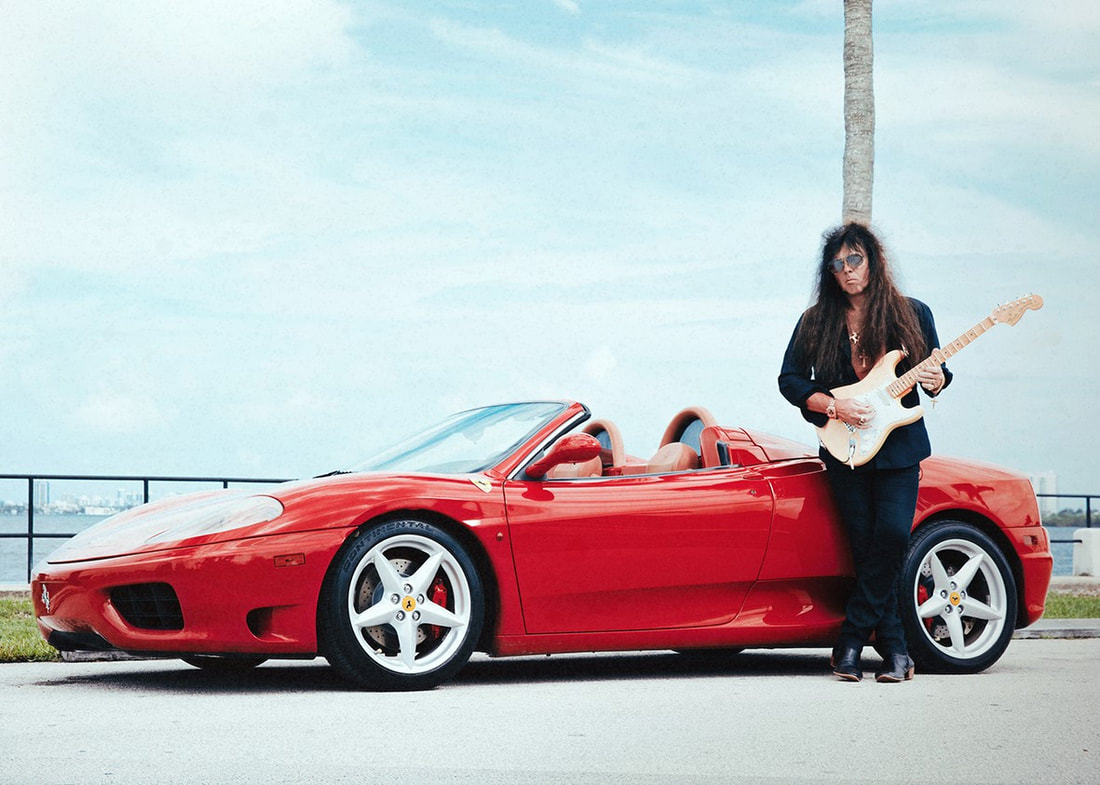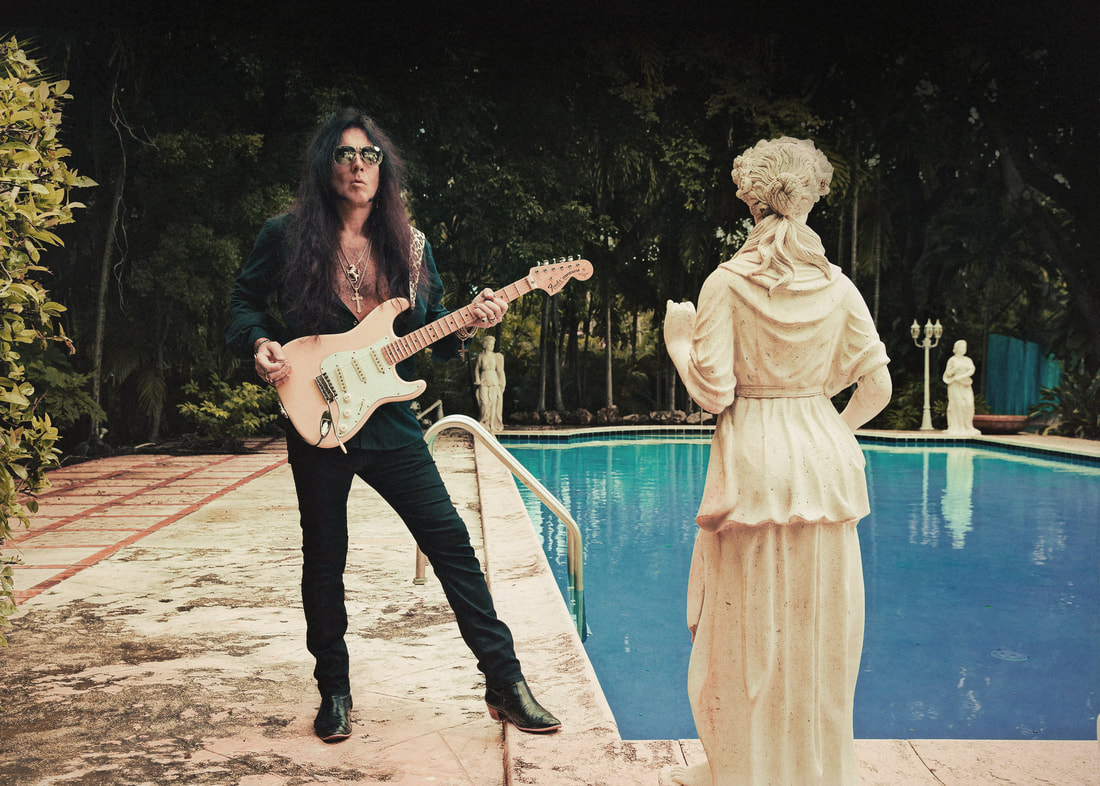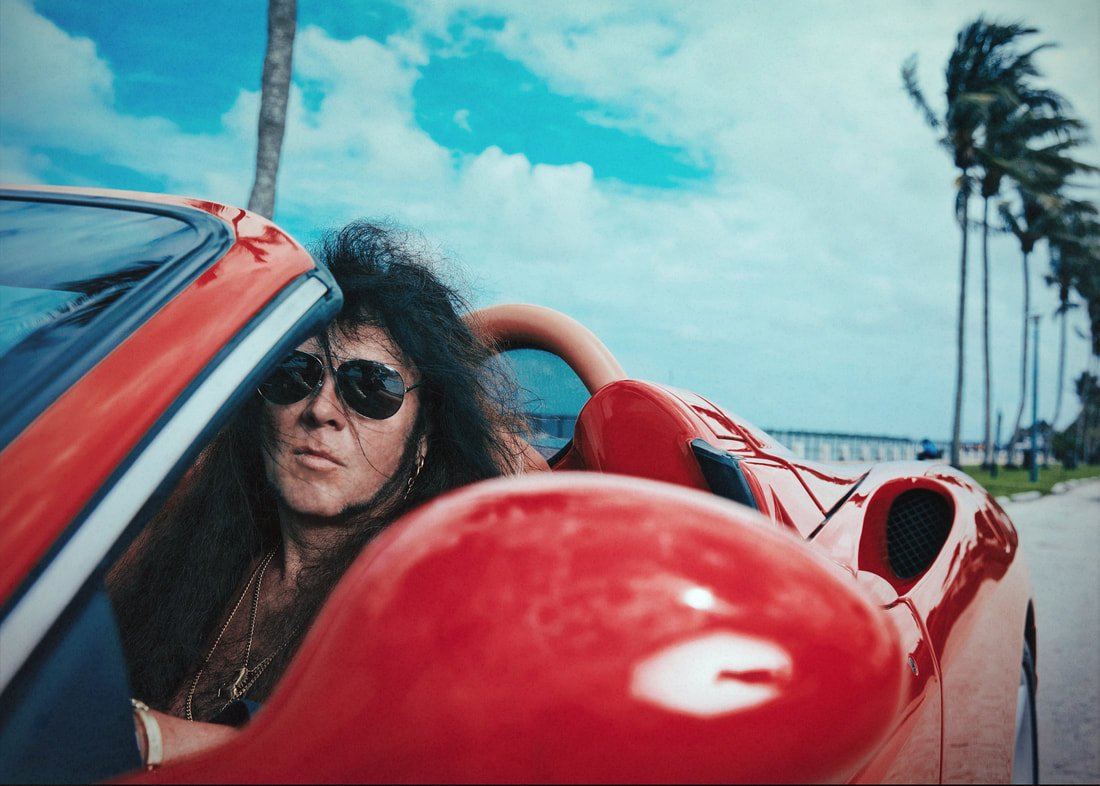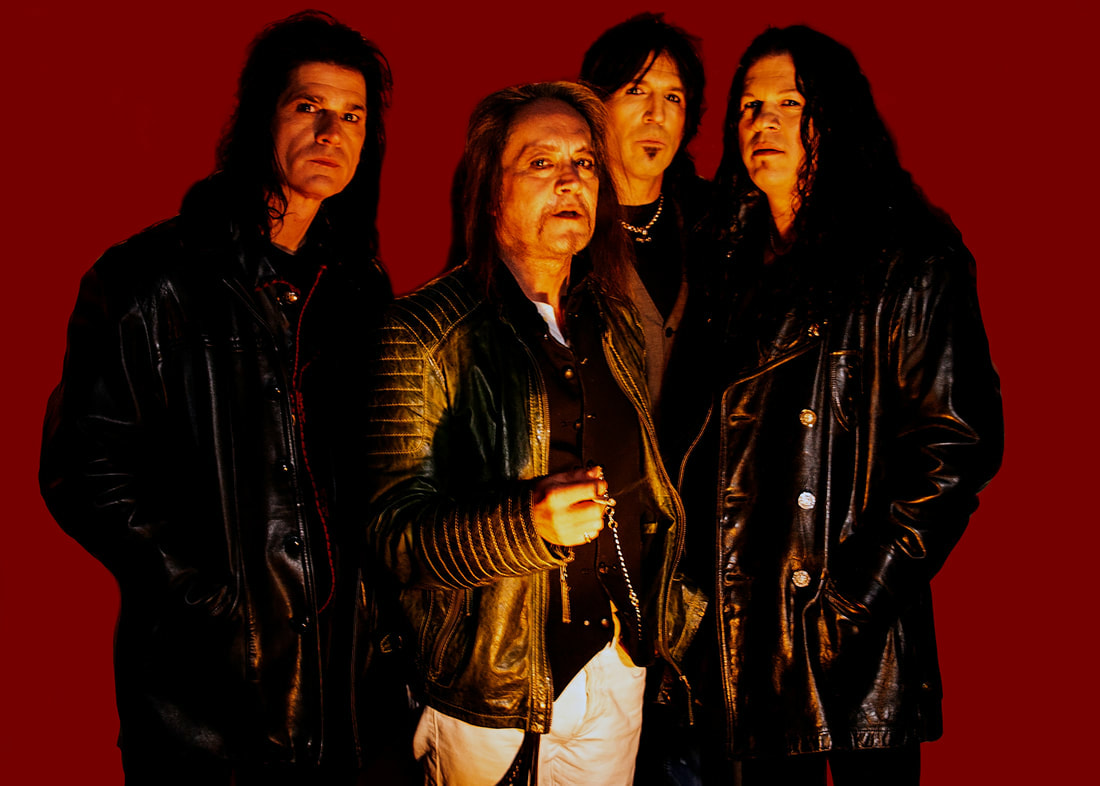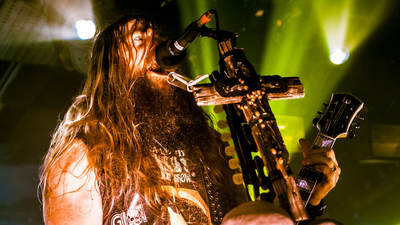|
One of Time Magazine’s top ten greatest guitar players of all time, it’s fair to say that Yngwie Malmsteen is a master of his instrument. Not only that, but he’s a pretty damn interesting and entertaining interviewee, as will become apparent. Having recently unleashed startling new album 'Parabellum', we caught up with the Swede to talk returning to his neoclassical roots, showmanship, and the bands that tried to steal him away from his solo career. Odyssey; Eamon O’Neill.
Hi Yngwie, how are you doing?
I’m actually doing obscenely well, and cruising around in the convertible in Miami Beach. Last time you spoke to eonmusic, you had just released the blues album 'Blue Lightening'; did you enjoy doing something a little bit different? I did, actually. I thought it was great. It felt very natural too, because as I explained before, my first musical journey was the blues anyway. When I was just a little kid, when I was seven years old, I first got into classical music, but the blues is no stranger to me. Blues to me, is a little wider than just a twelve-bar, you know what I’m saying? I think that Deep Purple is blues, and I think Led Zeppelin is blues, not to mention ZZ Top and AC/DC; I fuckin’ love these bands. Eric Clapton, of course, B.B. King; listen, I love that stuff! The reason I got away from it when I was a little kid was because I wanted to climb Mound Everest, but I felt like I was just climbing some big hill and back; I didn’t feel any challenge in it, so that’s why I got into baroque. You’re back on more familiar territory with ‘Parabellum’; is it good to be back to playing in a style you’re more well-known for? You know, the truth of the matter is I never went away. I mean, during the time I was recording ‘Blue Lightening’ I was touring, and I would play my neoclassical stuff all day long. It felt very natural, like I said. Over the years I would play the blues on stage, and I would play like a blues solo on each album, so it wasn’t like it was really weird. I never intended to change path or anything like that. Basically, since I would remember, I would break into the blues on soundcheck or whatever, and everybody’s going; “you should make a blues album!” Hey, whatever. So one day, Ed [Van Zijl] from Mascot [Records] came to me and said that’s what he wants me to do like a bluesy album. So I said; “fuck it, let’s do it!” But then again, I think if anybody had an idea that I would change my way, that was never the intention. Nevertheless, ‘Parabellum’ is definitely rooted in your neoclassical style. I got to be honest with you, it was the most natural thing to do; I don’t even think about what I’m doing; I’m just doing it. That’s what this ‘Parabellum’ album is; it just happens by itself. I don’t say; “oh, now I’m going to do a neoclassical record” – I just do what I do, and that’s what happens. That’s what I am, that’s what I have inside me, you know? The album opens with ‘Wolves at the Door’, which really punches the listener in the face; it’s a relentless number, isn’t it? Well, thank you! You know, I think it was a good song to open the album with. It’s extremely difficult to sequence an album, I think, and the most simple thing is to get the first song because once you have the first song, you can kind of like, line them up afterwards. I don’t like to think like; “oh yeah, let me put the best stuff at the beginning”, because I think of it more like a story, almost; like a movie or something. You’ve got to have a big ending too! When I came to America, I was 18 years old. I was speaking fluent English – I learned English very early on as a kid – and I spoke like the Queen’s English, basically – I spoke like that [affects impressive cockney accent], so I came to America, and I was recording the album with Alcatrazz [‘No Parole From Rock and Roll', 1983] and I’m sitting there in the studio, and there was a producer there, and this producer was some sort of hotshot, and I do the solo, and he goes; “wow, that was really good, man! Can we do one more just a little bit slower? Remember; less is more”; and I’d never heard that term before. I thought he misspoke. I thought he meant ‘more is more’, so that’s how that started; in other words; I’ve always been a little bit excessive, so that’s what you hear there. You mentioned the sequencing of the album, and ‘Parabellum’ is nicely paced between instrumentals, vocal tracks, and something like ‘Eternal Bliss’, something else again.
It is extremely important, and it’s extremely difficult too. I’m so happy that you feel that I’ve did that, because I felt like, obviously, you do a track like ‘(Si Vis Pacem) Parabellum’, and then ‘Eternal Bliss’, and then after that is another thing; it’s not easy to do, but I always feel like these are my kids, like these are my little children, and I don’t love one more than the other. I love them all; I love all the children. ‘Eternal Bliss’ really does feel like an epic. Well thank you again. I feel very strongly about that one too, because it’s got a very personal lyric. I’m not just bullshitting you, I basically thank god every day. I’m the most grateful man that ever lived. I’m very grateful. I’ve had some seriously bad things happen to me as well, obviously, very, very bad things, but I count my blessings, and I always look at the good parts. I’m so happy about everything. I feel very fortunate. I’ve worked really hard, and I’ve been fucked over many times, but at the end of the day, you have to look at it as the glass half full. Tell me about the writing of that one. I wrote it in stages. I had the one chorus, but I didn’t have the other part. Then I had the acoustic chord progression; "this could be a nice verse", and then I recorded it, put some vocals on there, and yeah, I liked it. Then I listened to it a capella, to the vocal chorus, and then I said; “fuck! We should have this at the beginning!”, and we moved it to the beginning of the song, and that makes the song, like you said; it’s almost like a journey than just the standard, starting this way, chorus / verse / chorus. It doesn’t have a normal arrangement, so that to me was really exciting and felt really good. My wife likes that one. There’s a fantastic acoustic sound on ‘God Particle’; if sounds really huge. Yeah, it’s an Ovation. I used an Ovation; it’s called the ‘Malmsteen Model’. I’ve had it for years. I used that one, and I used it for the whole album. It’s got like a baroque feel to it, and I obviously love that. It’s just lined in; its not even mic'd in. On the other side of things, you have a song like ‘Fight the Fight’, which is a great, driving hard rock song. Yeah, That was one of those I was actually thinking of opening with that song. I felt, well, it’s got an acoustic intro, it’s got a long guitar solo, it’s not as compact, but I really like that one. I’m going to try that one on stage. Yeah, that one, oh my god, that song went through so many changes. That’s the part of this stupid pandemic thing; I had so much time I could move things around and change it around with different beats and different arrangements. I’m really pleased with that one too. Has the pandemic given you a lot more time and freedom to really focus on the recordings than you would have had otherwise? Yeah, but the thing is, I learned many years ago that too much time is not good either. Too much time, it kills the spirit of the songs. I have the luxury of owning my own studio. I had it built, what, 1995; a long time ago, and I’m very proud of it. The beautiful thing with it is I can go in there when I feel inspired. So I go in there when I’m inspired to write, I go in there when I’m inspired to record, and because I was given all this time, it didn’t mean I was going to go in there if I didn’t feel inspired; it was the same thing. The difference was that [in normal times] I’d start to record something, then I’d go on the road and then I’d go back in and record something and so on, so this is more like way back in the day when you would take time off form the road just to record, which is more like in the early ‘80s. So, I think it was good in a lot of ways, because we usually fall into the trap of overanalysing things too, which I try not to do. I want to keep the pureness of things. 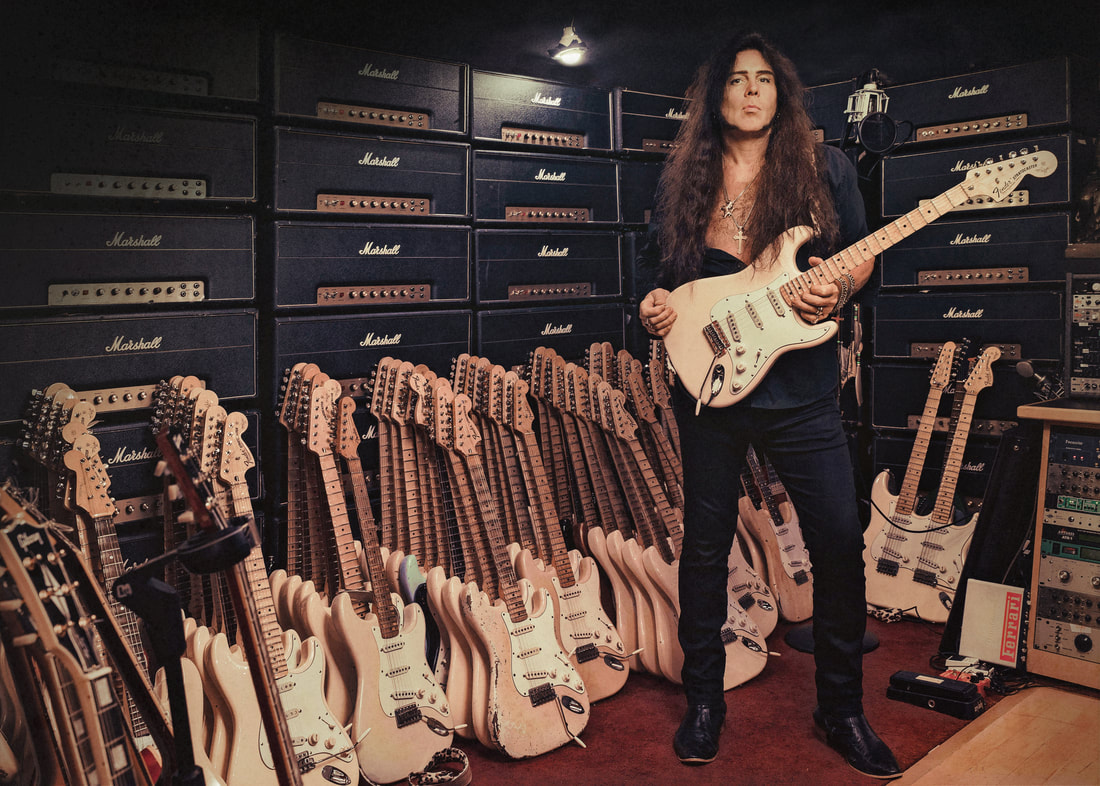 Photo: Austin Hargrave. Photo: Austin Hargrave.
I’ve seen photos of your studio with all the guitars lying against the walls; they’re obviously tools, not relics for you. That’s about right, yeah. I don’t really have another place to put them! I should hang them on the wall somewhere! I actually ended up just using two different guitars on this album. I used a Fender Yngwie Malmsteen Strat, that I call Number 7, and then one I call Number 2 that I use on stage. I used them for recording, and I used a ’59 for one little thing, and a ’55, a stupid thing that was not scalloped; it was horrible! I did it because it has different pickups, almost like a Brian May wire in there. That’s in that little break in ‘Relentless Fury’, before the verse. Other than that, I just used some old standard factory guitars. You favourite guitar, reportedly, is your 1972 Fender Strat, ‘the Duck’. It’s ’71, actually. I forgot, but I actually used that a little bit on the album. It’s got a lot of mojo, for sure. The neck is exactly the way I like it, and so on, but I have that, and the custom shop, master built replicas too that they made me too, at Fender. Do you have any of the other guitars you were associated with early in your career, like the Schecters and Aria Pros? I never really used them. That was more like a little.. false advertising! You’re a massive Richie Blackmore fan; do you own any of his old guitars, or any other rare ones? Yeah! I used to have one that I know was his, but I don’t know what happened to it, but I have a sunburst I think was his too. I have Brian May’s guitar; I’ve got Uli’s [Jonh Roth] guitar that he gave to me. I gave him one of mine too. It’s really crazy to play; it’s got seven strings and like five hundred frets! It’s totally different for me. It’s great. It’s cool. How have you managed to maintain your amazing guitar technique after all these years? The thing is that, I think that if you dedicate so many years, so much intensity and so much dedication and so much passion into something, and you do it, and you’re very relentless, and you have like a goal and you refuse to accept any failure on it, if you do that for so many goddamn years, it becomes much more second nature than anything else. You also remember that technique is only a means to get music out; it’s not technique for the case of technique. I use the term ‘relentless’; I’m completely unstoppable! If I just put my mind to something, I will not stop until I’m there, and that includes reaching a certain level of the instrument, or whatever it may be. It could be anything in life, basically. So, obviously I don’t accept any sort of sloppiness or half-assed shit. If I feel inspired, I play more, but then if I’m on the road, I play more than I should, and if I’m in the studio I play a lot too, so it’s never really a downtime on it. And if there’s no touring or no recording, I play anyway, because I love it. In terms of showmanship, you used to karate kick guitar picks into the audience; how did you learn that?! Did you practise that in front of a mirror?!
It’s funny you should say that because all these thing s that I do, this crazy shit, is something I’ve developed as I was actually on stage. I grew up on the stage! I can’t even remember when I wasn’t. I made money doing shows when I was ten years old, and I used to build guitars in wood shops, and smash them up and burn them. I had this whole thing about if I’m going to go on stage, I’m not going to just fucking stand there. That’s not what I’d want to see, so to me, the whole thing about spinning the guitar around your head and shit like this, I came up with that because I wanted to, instead of Hendrix – he would throw a guitar halfway to his back – I said; “what happens if you throw it so hard it comes right back at you?” I did that, and I lost a lot of jackets, a lot of guitars! I like doing that stuff. It’s fun. It’s not something I’ve practised in or something. It’s part of what I do. It’s not like a ‘show’; it is a show, obviously, but it feels natural, and it only happens in front of an audience. With skills like yours, you must have been approached to join some big bands over the years. Yeah, of course. Quite a lot, actually. I was offered a gig in UFO, I was offered a gig with David Lee Roth. There was some murmur about the Ozzy thing. Ronnie James Dio, he talked about it all the time. When I actually lived in Sweden, I was offered a gig in Kiss! The wanted to talk to me. They called me up, and I was in Sweden, right, and the guy said; “are you hot?”, and then he asked me; “are you six feet tall?”, and I’m metric, right? I’m 6’3, I’m actually quite tall, I’m 192cm, so I said; “no, I’m 192”, and he goes; “what the fuck’s that?!”, so they never called back, so I didn’t end up with an Ankh on my face! Were you ever offered the Deep Purple gig? There was murmurs. Me and Roger Glover always got along. I got along with Richie Blackmore too, but Ian Gillan, for some reason he… I did a show with him once, and we had the greatest time, it was a lot of fun, but then I did a tour with him a few years ago, and he didn’t seem to like me a lot, so I don’t know. Finally, what’s next for you? Well, I’m touring the States. I’m gigging, basically, and I’m going to be gigging for a year in the States. I’m definitely not going back in the studio right now! I’m spent for now. Like this interview? Like us on Facebook and follow us on Twitter for regular updates & more of the same. Yngwie Malmsteen's 'Parabellum' is out now via Mascot Label. |
|
Yngwie Malmsteen
"I’m completely unstoppable! If I just put my mind to something, I will not stop until I’m there".
© 2016 - 2024 eonmusic.co.ukContact: [email protected]
|

